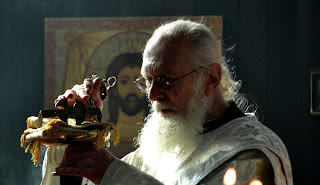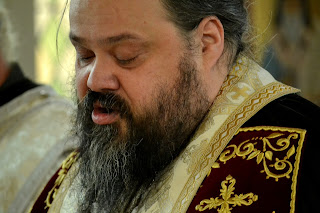Saturday, January 26, 2013
Sunday, January 20, 2013
St John of Damascus on the Orthodox Faith Chpt 10
Chapter 10. Concerning divine union and separation.
Therefore all these names must be understood as common to deity as a whole, and as containing the notions of sameness and simplicity and indivisibility and union: while the names Father, Son and Spirit, and causeless and caused, and unbegotten and begotten, and procession contain the idea of separation: for these terms do not explain His essence, but the mutual relationship and manner of existence.
When, then, we have perceived these things and are conducted from these to the divine essence, we do not apprehend the essence itself but only the attributes of the essence: just as we have not apprehended the essence of the soul even when we have learned that it is incorporeal and without magnitude and form: nor again, the essence of the body when we know that it is white or black, but only the attributes of the essence.
Further, the true doctrine teaches that the Deity is simple and has one simple energy, good and energizing in all things, just as the sun's ray, which warms all things and energizes in each in harmony with its natural aptitude and receptive power, having obtained this form of energy from God, its Maker.
But quite distinct is all that pertains to the divine and benignant incarnation of the divine Word. For in that neither the Father nor the Spirit have any part at all, unless so far as regards approval and the working of inexplicable miracles which the God-Word, having become man like us, worked, as unchangeable God and son of God.
St John of Damascus
St John of Damascus- on the Orthodox Faith Chpt 9
Chapter 9. Concerning what is affirmed about God.
The Deity is simple and uncompounded. But that which is composed of many and different elements, is compound. If, then, we should speak of the qualities of being uncreated and without beginning and incorporeal and immortal and everlasting and good and creative and so forth as essential differences in the case of God, that which is composed of so many qualities will not be simple but must be compound.
But this is impious in the extreme.
Each, then of the affirmations about God should be thought of as signifying not what He is in essence, but either something that it is impossible to make plain, or some relation to some of those things, which are contrasts, or some of those things that follow the nature, or an energy.
It appears then that the most proper of all the names given to God is - He that is, as He Himself said in answer to Moses on the mountain, Say to the sons of Israel, He that is has sent Me. (Exodus 3:14)
For He keeps all being in His own embrace, like a sea of essence infinite and unseen. Or as the holy Dionysius says, He that is good. For one cannot say of God that He has being in the first place and goodness in the second.
The second name of God is ὁ Θεός, derived from θέειν , to run, because He courses through all things, or from αἴθειν, to burn: For God is a fire consuming all evil (Deut 4:24): or from θεᾶσθαι, because He is all-seeing (2 Maccabbees 10:5): for nothing can escape Him, and over all He keeps watch.
For He saw all things before they were, holding them timelessly in His thoughts; and each one conformably to His voluntary and timeless thought, which constitutes predetermination and image and pattern, comes into existence at the predetermined time.
The first name then conveys the notion of His existence and of the nature of His existence: while the second contains the idea of energy.
Further, the terms 'without beginning,' 'incorruptible,' 'unbegotten,' as also 'uncreated,' 'incorporeal,' 'unseen,' and so forth, explain what He is not: that is to say, they tell us that His being had no beginning, that He is not corruptible, nor created, nor corporeal, nor visible.
Again, goodness and justice and piety and such like names belong to the nature, but do not explain His actual essence.
Finally, Lord and King and names of that class indicate a relationship with their contrasts: for the name Lord has reference to those over whom the lord rules, and the name King to those under kingly authority, and the name Creator to the creatures, and the name Shepherd to the sheep he tends.
St John of Damascus
Saturday, January 19, 2013
Subscribe to:
Posts (Atom)














































































































